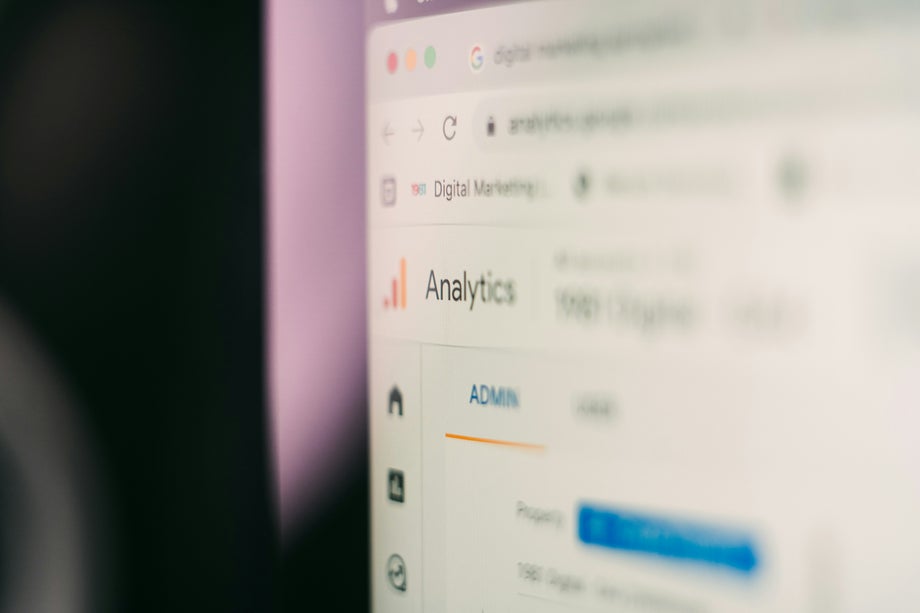

17.10.20249 mins read
Is AI the biggest threat humanity will ever face?
Like all really good questions, the answer is…. it’s complicated.
And the fun has only begun.
We’ve yet to see just how powerful AI is and will be and what the future holds as we navigate this new paradigm together. What we do know is that AI is transforming, disrupting, and revolutionising (pick your adjective) in an unprecedented way. Its reach is such that here in Ireland, the government has devised a National Digital Strategy, which aims to have 75% of enterprises in Ireland using AI by 2030.
However, for now, many other questions, offshoots of my original, need to be answered, regardless of the complexity.
Primarily, what should you be doing about AI in your organisation?
Senior leadership teams across the board are looking for strategies, yet so many are still struggling to find the right balance, the best fit for their teams and brands.
Despite the daily onslaught of headlines announcing AI's latest accomplishment, a look under the hood reveals a slightly different story.
Here are some highlights from the research on the subject of AI and current attitudes and implementations:
In one survey of over 1000 adults in Ireland,
- 35% said they have experimented with or regularly use AI for personal reasons
- 65% said they have never used AI for professional use.
Meanwhile, according to research from the Irish Management Institute (IMI), AI is not currently a strategic priority among most business leaders in Ireland.
When asked:
- Only 30% of business leaders consider AI a strategic priority.
- 40% stated that they are testing the technology in areas of their business.
- 30% reported struggling to keep pace with rapid advancements in technology
A 2024 Accenture report reveals that AI is not surprisingly a top priority for business leaders worldwide.
- 93% of executives agree that with rapid technological advancements, it is more important than ever for organisations to innovate with purpose.
- 95% of executives believe generative AI will compel their organisation to modernise its technology architecture
- 96% of executives agree that leveraging AI agency ecosystems will be a significant opportunity for their organisations in the next three years.
However, like most Irish businesses, there is a considerable gap between theory, what people want to plan for, and reality.
Too often, people use the term AI as a collective noun encompassing just about everything AI. There is a huge difference between using a tool like ChatGPT and an AI tool that predicts demand for a particular product, enabling better stock flow and reducing overstocking.
However, the phenomenal popularity of ChatGPT meant that suddenly, everyone was using AI - if only to improve their writing skills.
A quick refresher, in case you need it: Generative AI, sometimes called GenAI, is a type of artificial intelligence that can create new content such as text, images, videos, or audio based on patterns it has learned from existing data.

PwC’s latest GenAI Business Leaders Survey reveals that
- 83% expect GenAI to impact their business significantly- up 9% from 2023
- 55% believe it will increase jobs or have no net impact -
- 84% welcome the EU AI Act and similar legislation
- 91% believe it will increase cybersecurity risk in the next year
- 77% expect GenAI to positively affect the Irish economy over the next five years, similar to the 74% reported in November 2023
- 83% believe GenAI will significantly change how their organisations create, deliver, and capture value within the next three years.
- 50% expect GenAI to increase profitability by more than 5%, and 40% believe it will boost revenue by over 5%
This anticipation is driving executives to explore GenAI applications in areas such as customer targeting, financial planning, marketing, strategic planning and supply chain management.
Where are businesses planning to use Gen AI?
- IT development (22%)
- improve collaboration (17%),
- support sales & marketing (12%)
- and enhance supply chain (10%).
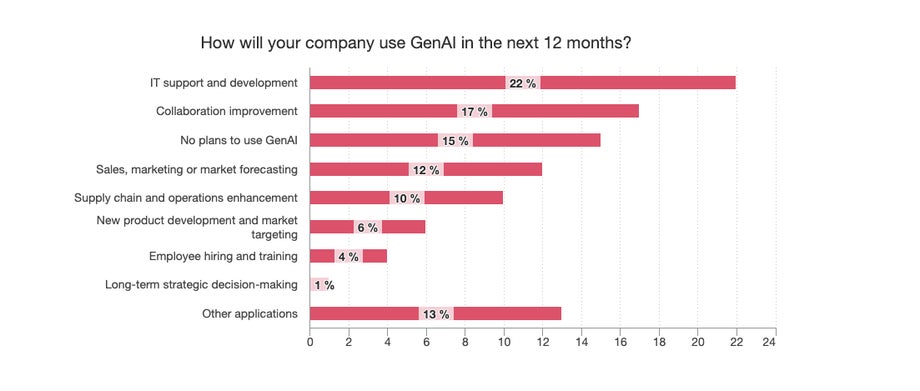
However, 15% of respondents have no plans to use GenAI in the year ahead, compared to 20% in November 2023.
- Only 7% reported to currently have AI and/or GenAI governance structures in place, similar to last November (6%).
- 75% are planning or developing a plan to have GenAI governance structures in place, up from 56% last year.
Irish business leaders remain optimistic about the impact of GenAI on the economy over the next five years with
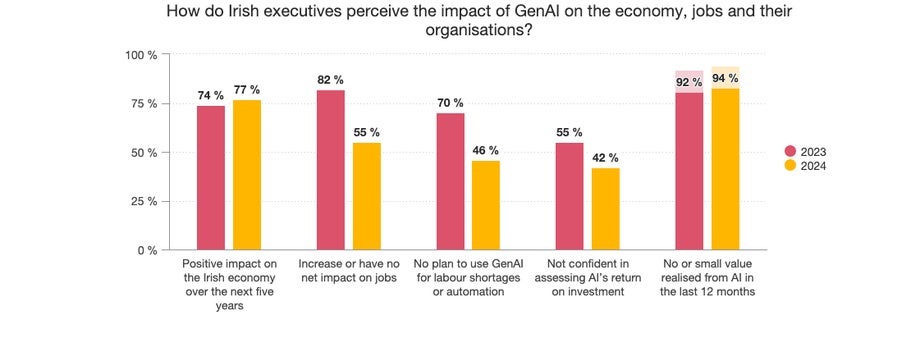
Not surprisingly, the number one use or value that business leaders are attributing AI to is increasing efficiencies and productivity.
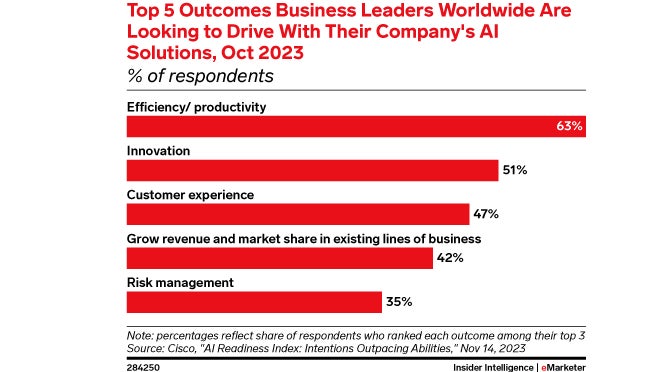
What that looks like on paper will vary from industry to industry, but for example, here’s what it might look like for a digital agency like All human.
AI helps us to:
- Automate repetitive tasks, in particular across development (GitHub Copilot) and QA (Katalon)
- Generate data insights by identifying new trends and consumer preferences.
- Expedite UX prototyping and testing for usability insights.
- Support our commitment to creating digital experiences for the human end user through chatbots, enhanced search facilities, and OpenAI software development kits (SDKs) for more engaged experiences. In this sense, AI empowers and engages the user to make critical decisions.
Are companies seeing their ROI yet?
Again, there is no clear answer. According to a recent Goldman Sachs report, despite the spending spree on large language models, which they estimate could be as much as €926 billion in the coming years, generative AI may have a limited economic upside in the next decade, arguing that “the technology isn’t designed to solve the complex problems that would justify the costs”, and that there was “little to show for the spending so far”.
And then there is the “green” cost.
Here are some interesting snippets from Google’s 2024 Environmental Report.
- In 2023, its total data centre electricity consumption grew 17%.
- According to the IEA, estimated global data centre electricity consumption represents around 1–1.3% of global electricity demand.
- Overall, its total GHG emissions increased by 13%—highlighting the challenge of reducing emissions while computing intensity increases and growing its technical infrastructure investment to support this AI transition.
- In 2023, its data centres consumed 6.1 billion gallons of water—17% more than the previous year, mirroring similar growth in electricity use.
In other words, as it currently stands, AI is a drain on the earth’s resources- and quite a hefty one at that.
Is AI the great saviour of CX? The missing key that forever changes how we interact online?
Again, this is another question that has no single answer.

What we do know is that Irish consumers, at least for now, are not convinced.
EY’s survey on How AI, cybersecurity and human interaction are shaping online shopping revealed:
- 54% of Irish consumers feel that AI-driven product recommendations in their shopping experience are not very useful, in stark contrast to just 32% globally.
- Only 8% of Irish consumers believe that AI greatly enhances the online shopping experience, compared to 19% of consumers worldwide.
- 96% of Irish consumers are aware of AI's role in their lives, yet only 16% have a good grasp of the technology, which is below the global average. This lack of AI literacy may be affecting trust, as seen in the low confidence Irish consumers have in AI when it comes to financial management (70%), marketing photo enhancement (71%), and medical advice (66%). Conversely, 65% trust AI for personalised promotions and online deals.
“The key to serving the changing consumer needs lies in understanding the delicate balance between technology and human insight. It's about leveraging technology to enhance, not replace, the human elements of trust and connection that are fundamental to consumer relationships. By doing so, we can create a retail environment that not only meets the expectations of the Irish consumer but also sets a new standard for the global digital marketplace.” says Colette Devey, Consulting Partner and Consumer Sector Lead at EY Ireland (emphasis mine).
While not wanting to read like some sci-fi storyline, there is a rising sense of rebellion or resistance at the very least. Apple’s “Crush” misstep and Google’s Dear Sydney fiasco point to a growing sense of frustration with the messaging around AI. While Etsy and Dove are pushing out ads that focus on the human, and offer a reminder that we must never forget humanity’s power and potential.
Data appears to confirm this resistance. One US study found that:
- 77% of consumers believe positive customer experiences still need an element of human touch
- 58% want companies to be clear about when AI is being used
- 76% say that they are less likely to trust and continue engaging with a brand if consumers sense disjointed communication with AI across channels
- Only one-third of consumers see positive CX impact from AI in website, mobile, text/SMS and in-store interactions
- 1 in 4 consumers also see improvements for email and phone
- Consumers rank chatbots as the most ideal use of AI to improve the customer experience, but 70% prefer human interaction over chatbots.
It’s not just people in the US who want more human interaction with brands. Some 64% of Irish consumers prefer online platforms that offer human customer service support. This is hardly surprising, given that interactions such as post-purchase issues, returns, and refunds can be very emotional, and therefore, people are looking for a sympathetic rather than an automated response.
In other words, as much as people appreciate and see the value in AI and how it enhances their experiences, they still want to see and be seen by a human. It is about making a connection, forming a relationship, and feeling valued as something more than a piece of data.
As a Forbes article explains, brands need to move from an emphasis on “personalisation” to a goal of “making it personal,” using a human decision-making framework based on building relationships and understanding how consumers perceive them.
We discovered this preference for humans in commercial transactions when we asked over 2000 people about their online shopping habits, focusing on the delivery experience.
In The last mile: the role of innovation in reshaping the delivery experience we found that
- Shoppers in Ireland and the UK want to have a sense of control over the experience - that it is human-led
“I would usually have a chat with my local postman about the package if something seemed strange with waiting times; he's very good; if there are any issues, he would usually text me or know where to leave something.”
- 39% would like to be able to select specific date and time for delivery
- 37% would like to choose which time slot
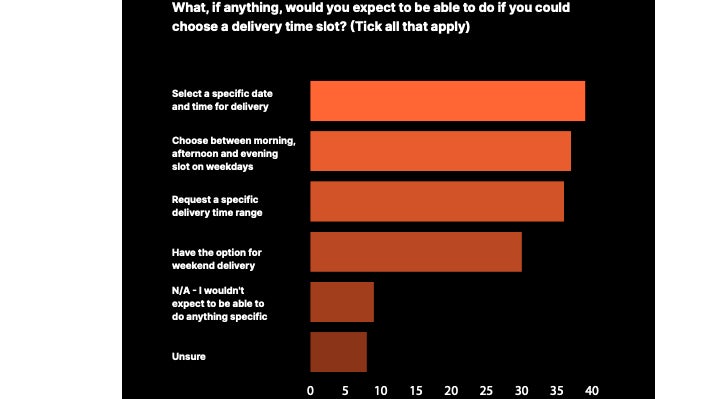
This people-centric message resonates with us. We firmly believe that great digital experiences come from a deep understanding of your end user, knowledge that is only borne out of extensive research—both quantitative and qualitative—and fine-tuned continuously.
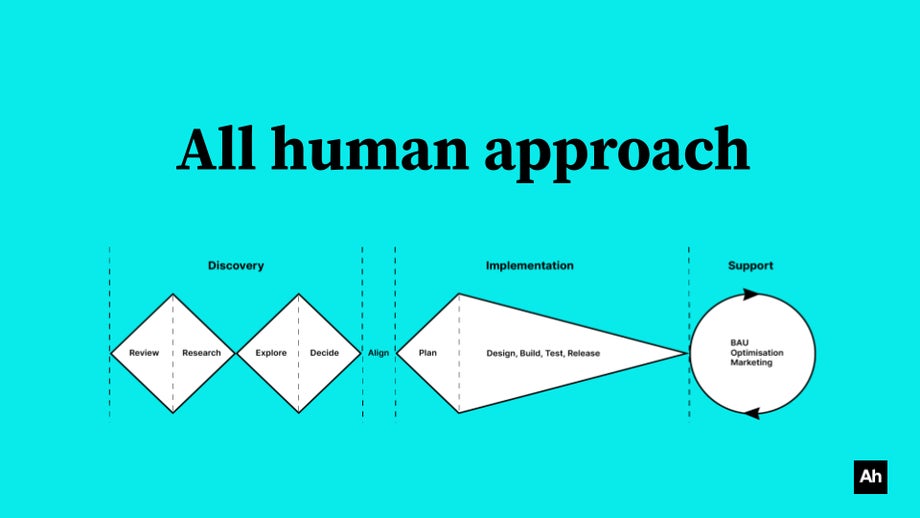
Whether we are working with insurance giants, An Post or Fáilte Ireland, we always look to the end user first.
Global warming may yet prove to be humanity's biggest threat, but giving AI a blank cheque is courting disaster.

Be the first to hear about news, insights and innovation, directly in your inbox, in the All human Newsletter.


